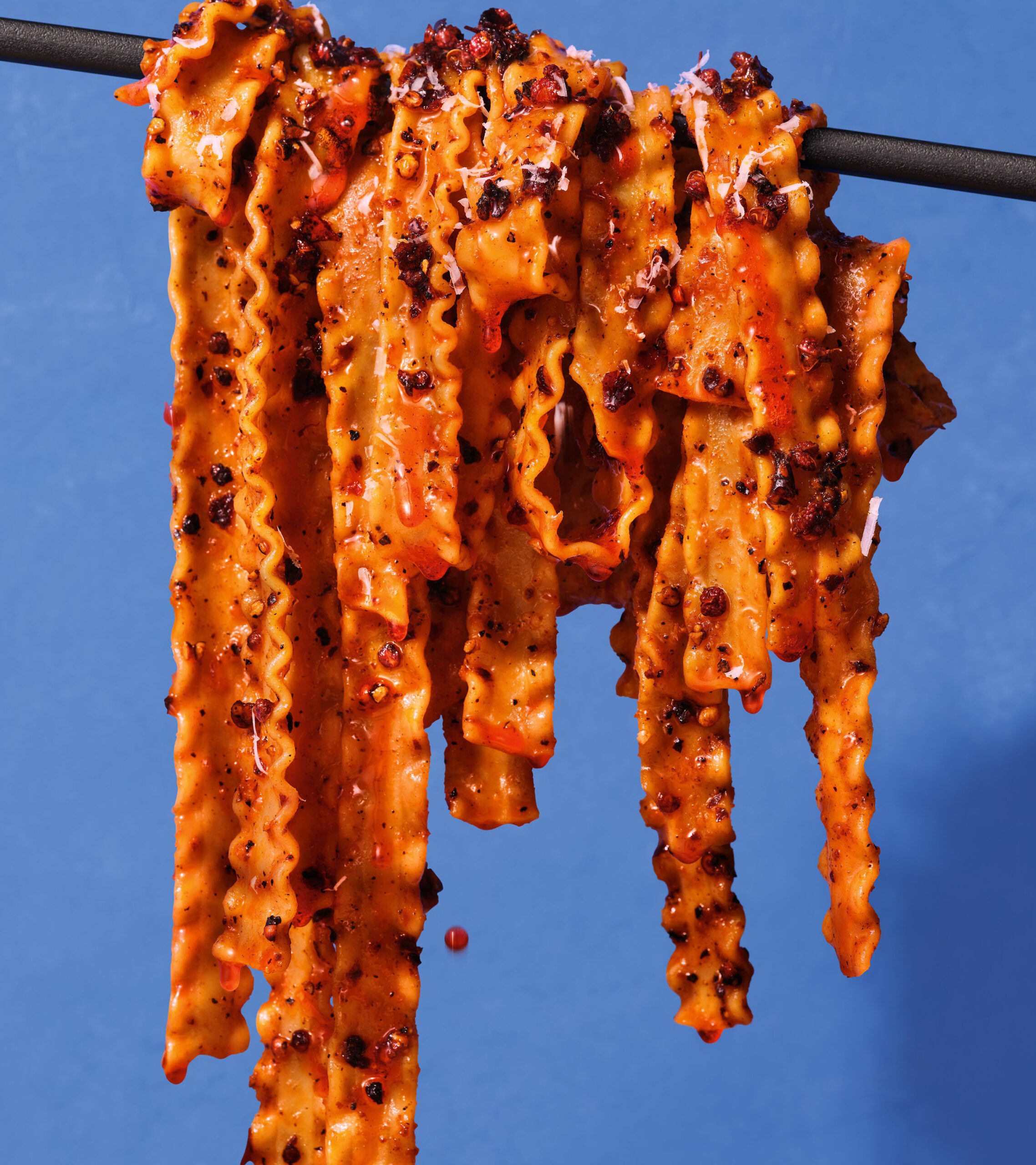NEW YORK (AP) — Food writer and podcaster Dan Pashman made the unusual step a few years ago of creating an entirely new shape of pasta. The obvious next step? Writing a cookbook to highlight it.
Pashman’s “Anything’s Pastable ” features dishes using 34 different pasta shapes, but especially features his cascatelli, a graceful, ruffled-edged curved shape that resembles a quotation mark. Time magazine declared cascatelli one of 2021’s best inventions.
Pashman came up with the idea of writing a pasta cookbook after he noticed that many of cascatelli’s fans were sending him images of them eating it in very traditional ways. Maybe even boring ways.
“A huge percentage of the photos I was getting were just tomato sauce, meat sauce, mac ‘n’ cheese. Maybe a few party animals made pesto,” he says. “It just made me a little bit sad. Those are all delicious, but there’s just so much more.”
So Pashman — a James Beard Award winner and Webby Award-winning podcaster behind The Sporkful — got to work creating mind-bending pasta dishes, from Tortellini in Kimchi Parmesan Brodo to Gnocchi and Sauerkraut.

CLASSIC SAUCES GET NEW TWISTS
This is not a traditional pasta sauce book by any means and Pashman even avoids making any classic marinara. Instead, there are flavours from places like India, Thailand, the Middle East, North African, Mexico, Japan and Peru.
He even makes a pizza out of fettuccine — a pasta pizza.
“When I go to make a cookbook or make pasta, it’s not my instinct to limit myself to only the classic Italian dishes that I grew up eating. It’s also all the other things that I love to eat,” he says.
Pashman dreamed up many of the dishes — the pasta pizza came to him while he was driving — and leaned on a half dozen recipe developers to offer their takes, suggestions and refinement.
The book is a clever mix of possibilities, like Mac ‘N’ Dal, which combines lentils and pigeon peas with cumin, coriander, turmeric, yoghurt and lumache pasta. Or Linguini with Miso Clam Sauce, a saucy take on a classic. Another dish adds chilli crisp to cacio e pepe. Or Tangy Labne Noodle Kugel with Persimmon Relish — your grandmother may have to look away.
“On the surface, I understand that this cookbook will look to a lot of people like somewhat radical,” he says. “But it’s a natural extension of the coming together of different cuisines in America.”
Italian food doesn’t stay the same either, he notes.
Despite the “stereotype of Italians as being sort of closed to any kind of change in tradition, the fact is that Italian pasta culture has been changing and evolving all the while,” he says. “As long as there are humans cooking in kitchens, then there will be new ideas and things will change and evolve.”
AN ANALYTICAL APPROACH
Pashman — a deliberate and even obsessive home chef who has long analysed everything from various salts to different cheese-grating methods — attacked the book in the same way.
“I approach food very analytically. I come from a long line of lawyers, and it’s always kind of my instinct to break a dish of food down to its component parts,” he says. “When you start to do that, you see there are a lot of similarities across cuisines.”
For one dish, he started with bolognese, Italy’s great meat sauce. Then he thought about other ground meat dishes. He remembered larb, a Laos meat salad. He reached out to recipe developer James Park and the two kept refining until they came up with a ground meat sauce for his cascatelli with mint, lemon juice, chilli and fish sauce.
Park, the author of the cookbook “Chili Crisp,” contributed to five recipes in Pashman’s book, and said the process “allowed me to push the boundaries of what pasta can be.”
“Food is a really safe and exciting playground where you can be free and combine so many different inspirations into one amazing dish. Dan really allowed me to go full force with my wild, exciting ideas,” he says.

CHOOSE WHAT FEELS GOOD
Pashman organised “Anything’s Pastable” in an intriguing way — by mood. “Adventures in Texture,” “Flavor Bombs Not Belly Bombs” and “Thick and Hearty, Warm and Toasty” are some of the sections. He made one for pasta salads and another for baked dishes.
“If you open up this book, I want you to be thinking, I’m in the mood for this type of pasta dish, and you should be able to find the chapter that’s going to give you that,” Pashman says.
Many of the dishes are designed to showcase cascatelli, which he designed with three goals: To have a shape with forkability, toothsinkability and sauceability — all terms he invented.
His signature paste endures as a favourite in the Pashman home. He says the family initially ate so much cascatelli that they burned out on it, but a few weeks ago returned after Dan made it with arugula pesto.
“Both my kids were like, ‘Wow, we missed cascatelli.'” he says.
“So that made me feel good.”





